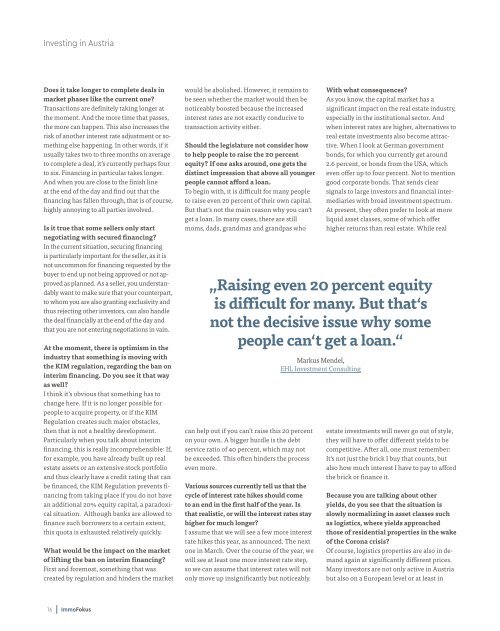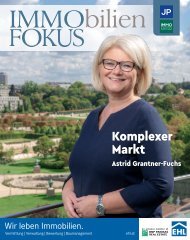MIPIM 2023 Digital Edition
Create successful ePaper yourself
Turn your PDF publications into a flip-book with our unique Google optimized e-Paper software.
Investing in Austria<br />
Does it take longer to complete deals in<br />
market phases like the current one?<br />
Transactions are definitely taking longer at<br />
the moment. And the more time that passes,<br />
the more can happen. This also increases the<br />
risk of another interest rate adjustment or something<br />
else happening. In other words, if it<br />
usually takes two to three months on average<br />
to complete a deal, it‘s currently perhaps four<br />
to six. Financing in particular takes longer.<br />
And when you are close to the finish line<br />
at the end of the day and find out that the<br />
financing has fallen through, that is of course,<br />
highly annoying to all parties involved.<br />
Is it true that some sellers only start<br />
negotiating with secured financing?<br />
In the current situation, securing financing<br />
is particularly important for the seller, as it is<br />
not uncommon for financing requested by the<br />
buyer to end up not being approved or not approved<br />
as planned. As a seller, you understandably<br />
want to make sure that your counterpart,<br />
to whom you are also granting exclusivity and<br />
thus rejecting other investors, can also handle<br />
the deal financially at the end of the day and<br />
that you are not entering negotiations in vain.<br />
At the moment, there is optimism in the<br />
industry that something is moving with<br />
the KIM regulation, regarding the ban on<br />
interim financing. Do you see it that way<br />
as well?<br />
I think it‘s obvious that something has to<br />
change here. If it is no longer possible for<br />
people to acquire property, or if the KIM<br />
Regulation creates such major obstacles,<br />
then that is not a healthy development.<br />
Particularly when you talk about interim<br />
financing, this is really incomprehensible: If,<br />
for example, you have already built up real<br />
estate assets or an extensive stock portfolio<br />
and thus clearly have a credit rating that can<br />
be financed, the KIM Regulation prevents financing<br />
from taking place if you do not have<br />
an additional 20% equity capital, a paradoxical<br />
situation. Although banks are allowed to<br />
finance such borrowers to a certain extent,<br />
this quota is exhausted relatively quickly.<br />
What would be the impact on the market<br />
of lifting the ban on interim financing?<br />
First and foremost, something that was<br />
created by regulation and hinders the market<br />
would be abolished. However, it remains to<br />
be seen whether the market would then be<br />
noticeably boosted because the increased<br />
interest rates are not exactly conducive to<br />
transaction activity either.<br />
Should the legislature not consider how<br />
to help people to raise the 20 percent<br />
equity? If one asks around, one gets the<br />
distinct impression that above all younger<br />
people cannot afford a loan.<br />
To begin with, it is difficult for many people<br />
to raise even 20 percent of their own capital.<br />
But that‘s not the main reason why you can‘t<br />
get a loan. In many cases, there are still<br />
moms, dads, grandmas and grandpas who<br />
can help out if you can’t raise this 20 percent<br />
on your own. A bigger hurdle is the debt<br />
service ratio of 40 percent, which may not<br />
be exceeded. This often hinders the process<br />
even more.<br />
Various sources currently tell us that the<br />
cycle of interest rate hikes should come<br />
to an end in the first half of the year. Is<br />
that realistic, or will the interest rates stay<br />
higher for much longer?<br />
I assume that we will see a few more interest<br />
rate hikes this year, as announced. The next<br />
one in March. Over the course of the year, we<br />
will see at least one more interest rate step,<br />
so we can assume that interest rates will not<br />
only move up insignificantly but noticeably.<br />
With what consequences?<br />
As you know, the capital market has a<br />
significant impact on the real estate industry,<br />
especially in the institutional sector. And<br />
when interest rates are higher, alternatives to<br />
real estate investments also become attractive.<br />
When I look at German government<br />
bonds, for which you currently get around<br />
2.6 percent, or bonds from the USA, which<br />
even offer up to four percent. Not to mention<br />
good corporate bonds. That sends clear<br />
signals to large investors and financial intermediaries<br />
with broad investment spectrum.<br />
At present, they often prefer to look at more<br />
liquid asset classes, some of which offer<br />
higher returns than real estate. While real<br />
„Raising even 20 percent equity<br />
is difficult for many. But that‘s<br />
not the decisive issue why some<br />
people can‘t get a loan.“<br />
Markus Mendel,<br />
EHL Investment Consulting<br />
estate investments will never go out of style,<br />
they will have to offer different yields to be<br />
competitive. After all, one must remember:<br />
It‘s not just the brick I buy that counts, but<br />
also how much interest I have to pay to afford<br />
the brick or finance it.<br />
Because you are talking about other<br />
yields, do you see that the situation is<br />
slowly normalizing in asset classes such<br />
as logistics, where yields approached<br />
those of residential properties in the wake<br />
of the Corona crisis?<br />
Of course, logistics properties are also in demand<br />
again at significantly different prices.<br />
Many investors are not only active in Austria<br />
but also on a European level or at least in<br />
16 ImmoFokus

















